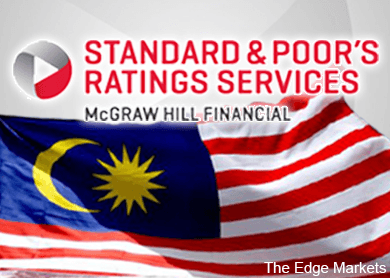
KUALA LUMPUR (Aug 20): The weakening ringgit by itself would have limited impact on the cash flow adequacy and operating performance of Petroliam Nasional Bhd (Petronas), Tenaga Nasional Bhd (TNB), Sime Darby Bhd and Genting Bhd, Standard & Poor's Ratings Services (S&P) said in a report, citing sound liquidity and their generally conservative financial policies.
The four are part of eight companies that the agency rates in Malaysia, which also include IOI Corp Bhd, Axiata Group Bhd, Telekom Malaysia Bhd and MISC Bhd.
"Although a prolonged weakness in the ringgit could bring the financial ratios of certain companies close to their downgrade triggers, factors that companies control, including spending strategies, dividends, and acquisitions, will remain more important for the rating transitions," said S&P in a report entitled Why A Weak Ringgit Won't Significantly Affect Rated Malaysian Companies that was released today.
The rating agency also does not see the depreciating ringgit and the resulting higher reported debt for companies to lead to negative rating actions.
"The companies we rate in Malaysia are all in the 'BBB' or 'A' rating categories. They generally have conservative financial policies and some flexibility to adjust capital spending and dividends, if operating conditions become tougher.
"They have moderate leverage, with a debt-to-ebitda (earnings before interest, taxes, depreciation, and amortisation) ratio of less than 3 times for most. Their liquidity is sound, with limited short-term debt maturities, ample cash balances, and sound access to capital markets," it said.
"The rating headroom for most of them is also adequate, and cash flow adequacy should generally remain within our target range, despite the higher reported debt," it added.
S&P noted that the foreign currency borrowing of the eight entities has increased moderately over the past three years.
"We estimated that these companies' total foreign currency debt reached the equivalent of RM102.3 billion for the most recent reporting period available (most of which are as of March 31, 2015). This compares with about RM85 billion as of Dec 31, 2011.
"These numbers appear high. But Petronas accounts for close to half of the total," it said.
These companies hedge their foreign currency exposures, albeit to varying degrees, S&P said, noting foreign currency debt is a major funding source for most of these rated companies.
"It now accounts for about two-thirds of total reported debt and more than half of the outstanding borrowings for six of the eight companies," it added.
S&P also believed the ringgit depreciation's indirect effects on companies' refinancing risk and liquidity will be modest, as the short-term refinancing requirements of the eight companies in the first half of 2016 are low, with only about RM19 billion of aggregated short-term debt.
"These companies' liquidity is adequate or strong, and the cash on hand for seven out of the eight companies amply covers the short-term debt maturities. For Sime Darby, the ratio is below 1 time.
"But the figure excludes multiyear revolving credit facilities, and we believe the company, like the other rated companies in Malaysia, has sound access to domestic and international bank and bond markets," said S&P.
The currency dropped as much as 1% to a 17-year low of 4.1442 per US dollar, before ending down 0.8% at 4.1375 today, Bloomberg reported.
"Not only has the currency weakened by about 15% since the beginning of the year, the depreciation has been accelerating over the past few weeks," said S&P.